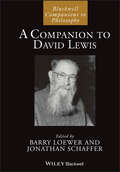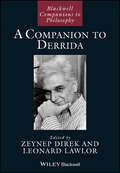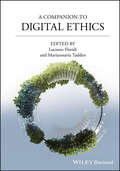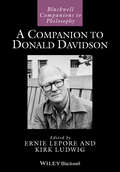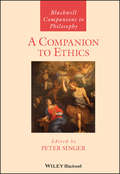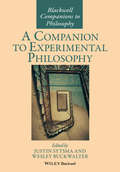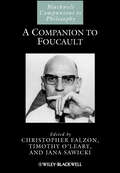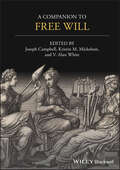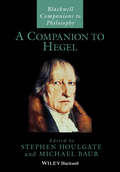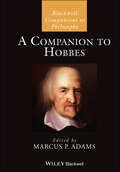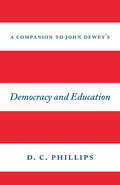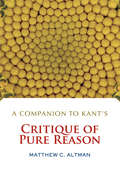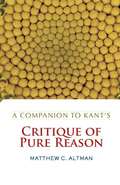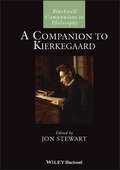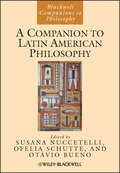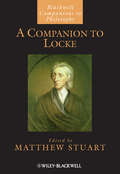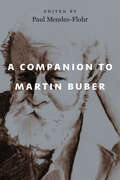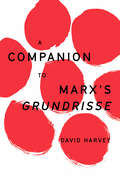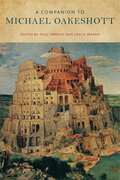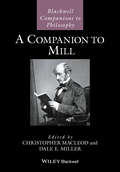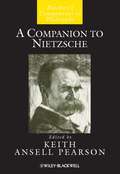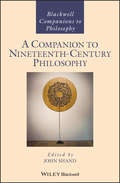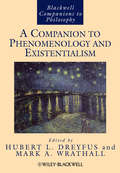- Table View
- List View
A Companion to David Lewis (Blackwell Companions to Philosophy)
by Jonathan Schaffer Barry LoewerIn A Companion to David Lewis, Barry Loewer and Jonathan Schaffer bring together top philosophers to explain, discuss, and critically extend Lewis's seminal work in original ways. Students and scholars will discover the underlying themes and complex interconnections woven through the diverse range of his work in metaphysics, philosophy of language, logic, epistemology, philosophy of science, philosophy of mind, ethics, and aesthetics. The first and only comprehensive study of the work of David Lewis, one of the most systematic and influential philosophers of the latter half of the 20th century Contributions shed light on the underlying themes and complex interconnections woven through Lewis's work across his enormous range of influence, including metaphysics, language, logic, epistemology, science, mind, ethics, and aesthetics Outstanding Lewis scholars and leading philosophers working in the fields Lewis influenced explain, discuss, and critically extend Lewis's work in original ways An essential resource for students and researchers across analytic philosophy that covers the major themes of Lewis's work
A Companion to Derrida (Blackwell Companions to Philosophy)
by Leonard Lawlor Zeynep DirekA Companion to Derrida is the most comprehensive single volume reference work on the thought of Jacques Derrida. Leading scholars present a summary of his most important accomplishments across a broad range of subjects, and offer new assessments of these achievements. The most comprehensive single volume reference work on the thought of Jacques Derrida, with contributions from highly prominent Derrida scholars Unique focus on three major philosophical themes of metaphysics and epistemology; ethics, religion, and politics; and art and literature Introduces the reader to the positions Derrida took in various areas of philosophy, as well as clarifying how derrideans interpret them in the present Contributions present not only a summary of Derrida’s most important accomplishments in relation to a wide range of disciplines, but also a new assessment of these accomplishments Offers a greater understanding of how Derrida’s work has fared since his death
A Companion to Digital Ethics (Blackwell Companions to Philosophy)
by Luciano Floridi Mariarosaria TaddeoA compilation of cutting-edge, comprehensive insights into digital ethics from leading scholars As digital technologies shape every aspect of today's society, ethical considerations have never been more pressing. In A Companion to Digital Ethics, editors Luciano Floridi and Mariarosaria Taddeo bring together leading experts to analyse key ethical challenges posed by artificial intelligence, privacy, cybersecurity, cyberwarfare, sustainability, digital consent, and many other topics. With a multidisciplinary approach, this authoritative volume introduces all the relevant topics in digital ethics clearly and accessibly, integrating insights from philosophy, law, computer science, and the social sciences. Unlike other collections that focus on specialised research or introductory overviews, this Companion strikes a critical balance—offering a systematic, comprehensive, simple yet rigorous examination of digital ethics that is both conceptually rich and practically relevant. Each chapter can be read as part of the whole or independently. Throughout the book, the contributing authors equip the reader with diverse perspectives for navigating ethical dilemmas in the evolving digital landscape, with an essential list of references and further readings. Integrating real-world examples and case studies throughout, A Companion to Digital Ethics: Explores the ethical value and implications of digital technologies and their applications Offers clear and precise analysis of both current and potential ethical challenges Includes discussions of ethical issues in contexts of technology governance and digital law Helps professionals and policymakers implement ethical principles in AI and digital technologies Contains authoritative and cutting-edge chapters, edited by two leading experts in digital ethics Whether used in academic courses or professional discussions on responsible digital innovation, A Companion to Digital Ethics is an essential guide to understanding and addressing the ethical questions of the digital age. It is a must-have resource for undergraduate and postgraduate students in any academic discipline, as well as policymakers and practitioners seeking to implement ethical frameworks for emerging technologies.
A Companion to Doing Ethics (Blackwell Companions to Philosophy)
by Alan A. Preti Timothy A. WeidelA comprehensive guide to practicing ethics across disciplines and contexts in the 21st century In an era of rapid technological advancements and complex societal challenges, A Companion to Doing Ethics is a vital resource for understanding and navigating the multifaceted role of ethics today. Edited by Alan A. Preti and Timothy A. Weidel, this timely volume explores how ethics has evolved from traditional academic theory into a multidisciplinary practice with real-world applications. Contributions from leading scholars and professionals working in diverse fields, including healthcare, business, public policy, and education, illuminate the dynamic ways ethics is applied in modern contexts. Whether an ethicist working in a university, a member of a hospital ethics board, or a leader at an applied humanities center, the Companion is your indispensable reference and guide. In-depth chapters address a broad range of vital topics—from the role of public philosophy to the need for ethics education in shaping responsible decision making—while offering a rich, interdisciplinary perspective on the challenges and responsibilities of ethical work. Providing insights into what it means to practice ethics in today's world by those actively engaged in the field, A Companion to Doing Ethics: Explores the expanding role of ethics across academic, professional, and public contexts Highlights non-Western and global approaches to ethical practice Examines the function and impact of ethics centers and applied humanities institutions Offers insights into the integration of ethics education across diverse curricula Features multidisciplinary case studies illustrating real-world ethical applications Part of the prestigious Blackwell Companions to Philosophy series, A Companion to Doing Ethics is essential reading for advanced undergraduate and graduate courses in ethics, applied philosophy, and public policy. It is also an invaluable resource for ethics center directors, healthcare ethics board members, business leaders, and educators seeking to deepen their understanding of contemporary ethical practice.
A Companion to Donald Davidson (Blackwell Companions to Philosophy #125)
by Kirk Ludwig Ernie LeporeA Companion to Donald Davidson presents newly commissioned essays by leading figures within contemporary philosophy. Taken together, they provide a comprehensive overview of Davidson’s work across its full range, and an assessment of his many contributions to philosophy. Highlights the breadth of Davidson's work across philosophy Demonstrates the continuing influence his work has on the philosophical community Includes newly commissioned contributions from leading figures in contemporary philosophy Provides an in-depth exposition and analysis of Davidson's work across the range of areas to which he contributed, including philosophy of action, epistemology, metaphysics, philosophy of language, and philosophy of mind
A Companion to Ethics
by Peter SingerIn this volume, some of today's most distinguished philosophers survey the whole field of ethics, from its origins, through the great ethical traditions, to theories of how we ought to live, arguments about specific ethical issues, and the nature of ethics itself. The book can be read straight through from beginning to end; yet the inclusion of a multi-layered index, coupled with a descriptive outline of contents and bibliographies of relevant literature, means that the volume also serves as a work of reference, both for those coming afresh to the study of ethics and for readers already familiar with the subject.
A Companion to Experimental Philosophy
by John Buckwalter Justin SytsmaThis is a comprehensive collection of essays that explores cutting-edge work in experimental philosophy, a radical new movement that applies quantitative and empirical methods to traditional topics of philosophical inquiry. Situates the discipline within Western philosophy and then surveys the work of experimental philosophers by sub-discipline Contains insights for a diverse range of fields, including linguistics, cognitive science, anthropology, economics, and psychology, as well as almost every area of professional philosophy today Edited by two rising scholars who take a broad and inclusive approach to the field Offers a complete introduction for non-specialists and students to the central approaches, findings, challenges, and controversies in experimental philosophy
A Companion to Foucault (Blackwell Companions to Philosophy)
by Timothy O'Leary Christopher Falzon Jana SawickiA Companion to Foucault comprises a collection of essays from established and emerging scholars that represent the most extensive treatment of French philosopher Michel Foucault’s works currently available. Comprises a comprehensive collection of authors and topics, with both established and emerging scholars represented Includes chapters that survey Foucault’s major works and others that approach his work from a range of thematic angles Engages extensively with Foucault's recently published lecture courses from the Collège de France Contains the first translation of the extensive ‘Chronology’ of Foucault’s life and works written by Foucault’s life-partner Daniel Defert Includes a bibliography of Foucault’s shorter works in English, cross-referenced to the standard French edition Dits et Ecrits
A Companion to Free Will (Blackwell Companions to Philosophy)
by Kristin M. Mickelson V. Alan White Joe CampbellProvides a comprehensive, cutting-edge, and accessible accompaniment to various narratives about free will A Companion to Free Will is an indispensable resource for anyone interested in the philosophy of free will, offering an authoritative survey of perennial issues and contemporary debates within the field. Bringing together the work of a diverse team of established and younger scholars, this well-balanced volume offers innovative perspectives and fresh approaches to the classical compatibility problem, moral and legal responsibility, consciousness in free action, action theory, determinism, logical fatalism, impossibilism, and much more. The Companion’s 30 chapters provide general coverage of the discipline as well as an in-depth exploration of both CAP (Classical Analytic Paradigm) and non-CAP perspectives on the problem of free will and the problem of determinism—raising new questions about what the free will debate is, or should be, about. Throughout the book, coverage of modern exchanges between the world’s leading philosophers is complemented by incisive commentary, novel insights, and selections that examine compatibilist, libertarian, and denialist viewpoints. Offers a balanced presentation of conflicting theories and ongoing debates about the nature, existence, and implications of free will Explores the role of scientific advances and empirical methods in contributing to discourses on free will and action theory Reviews new developments in longstanding arguments between compatibilist and incompatibilist approaches to free will including those that question this way of framing the debate and critique the standard terminology Discusses descriptive, revisionary, and pragmatic approaches for defining key concepts and addressing compatibility problems surrounding free will Considers various issues of moral responsibility and philosophical approaches to the problem of free will in new waysPart of the acclaimed Blackwell Companions to Philosophy series, A Companion to Free Will is essential reading for undergraduate and graduate students of philosophy, professional philosophers and theorists, and interested novices alike.
A Companion to Hegel
by Michael Baur Stephen HoulgateThis companion provides original, scholarly, and cutting-edge essays that cover the whole range of Hegel's mature thought and his lasting influence.A comprehensive guide to one of the most important modern philosophersEssays are written in an accessible manner and draw on the most up-to-date Hegel researchContributions are drawn from across the world and from a wide variety of philosophical approaches and traditionsExamines Hegel's influence on a range of thinkers, from Kierkegaard and Marx to Heidegger, Adorno and DerridaBegins with a chronology of Hegel's life and work and is then split into sections covering topics such as Philosophy of Nature, Aesthetics, and Philosophy of Religion
A Companion to Hobbes (Blackwell Companions to Philosophy)
by Marcus P. AdamsOffers comprehensive treatment of Thomas Hobbes’s thought, providing readers with different ways of understanding Hobbes as a systematic philosopher As one of the founders of modern political philosophy, Thomas Hobbes is best known for his ideas regarding the nature of legitimate government and the necessity of society submitting to the absolute authority of sovereign power. Yet Hobbes produced a wide range of writings, from translations of texts by Homer and Thucydides, to interpretations of Biblical books, to works devoted to geometry, optics, morality, and religion. Hobbes viewed himself as presenting a unified method for theoretical and practical science—an interconnected system of philosophy that provides many entry points into his thought. A Companion to Hobbes is an expertly curated collection of essays offering close textual engagement with the thought of Thomas Hobbes in his major works while probing his ideas regarding natural philosophy, mathematics, human nature, civil philosophy, religion, and more. The Companion discusses the ways in which scholars have tried to understand the unity and diversity of Hobbes’s philosophical system and examines the reception of the different parts of Hobbes’s philosophy by thinkers such as René Descartes, Margaret Cavendish, David Hume, and Immanuel Kant. Presenting a diversity of fresh perspectives by both emerging and established scholars, this volume: Provides a comprehensive treatment of Hobbes’s thought in his works, including Elements of Law, Elements of Philosophy, and Leviathan Explores the connecting points between Hobbes’ metaphysics, epistemology, mathematics, natural philosophy, morality, and civil philosophy Offers readers strategies for understanding how the parts of Hobbes’s philosophical system fit together Examines Hobbes’s philosophy of mathematics and his attempts to understand geometrical objects and definitions Considers Hobbes’s philosophy in contexts such as the natural state of humans, gender relations, and materialist worldviews Challenges conceptions of Hobbes’s moral theory and his views about the rights of sovereigns Part of the acclaimed Blackwell Companions to Philosophy series, A Companion to Hobbes is an invaluable resource for scholars and advanced students of Early modern thought, particularly those from disciplines such as History of Philosophy, Political Philosophy, Intellectual History, History of Politics, Political Theory, and English.
A Companion to John Dewey's Democracy and Education
by D.C. PhillipsThis year marks the centenary publication of John Dewey’s magnum opus, Democracy and Education. Despite its profound importance as a foundational text in education, it is notoriously difficult and—dare we say it—a little dry. In this charming and often funny companion, noted philosopher of education D. C. Phillips goes chapter by chapter to bring Dewey to a twenty-first-century audience. Drawing on over fifty years of thinking about this book—and on his own experiences as an educator—he lends it renewed clarity and a personal touch that proves its lasting importance. Phillips bridges several critical pitfalls of Democracy and Education that often prevent contemporary readers from fully understanding it. Where Dewey sorely needs a detailed example to illustrate a point—and the times are many—Phillips steps in, presenting cases from his own classroom experiences. Where Dewey casually refers to the works of people like Hegel, Herbart, and Locke—common knowledge, apparently, in 1916—Phillips fills in the necessary background. And where Dewey gets convoluted or is even flat-out wrong, Phillips does what few other scholars would do: he takes Dewey to task. The result is a lively accompaniment that helps us celebrate and be enriched by some of the most important ideas ever offered in education.
A Companion to Kant's Critique of Pure Reason
by Matthew C. AltmanImmanuel Kant's groundbreaking Critique of Pure Reason inaugurated a new way of understanding the world that continues to impact philosophy to the present day. With clear explanations and numerous examples, A Companion to Kant's Critique of Pure Reason takes students step by step through the book in a way that captures their interest without sacrificing depth or intellectual rigor. Although it is informed by recent Anglo-American scholarship, the Companion focuses on Kant's own arguments rather than secondary texts and scholarly debates that may otherwise distract from what Kant himself is attempting. The Companion first places the Critique in its historical and philosophical context before addressing the three main parts of the book in order: the Transcendental Aesthetic, the Transcendental Analytic, and the Transcendental Dialectic. The Companion also briefly explains how Kant continues his investigation into God, freedom, and immortality in the Critique of Practical Reason, and it concludes with an assessment of Kant's importance in the history of modern philosophy. Key features include a glossary of technical terms, with succinct definitions and cross-references, as well as an annotated bibliography of the most important English-language secondary sources on Kant's theoretical philosophy.
A Companion to Kant's: Critique of Pure Reason
by Matthew C. AltmanImmanuel Kant's groundbreaking Critique of Pure Reason inaugurated a new way of understanding the world that continues to impact philosophy to the present day. <P><P>With clear explanations and numerous examples, A Companion to Kant's "Critique of Pure Reason" takes students step by step through the book in a way that captures their interest without sacrificing depth or intellectual rigor. Although it is informed by recent Anglo-American scholarship, the Companion focuses on Kant's own arguments rather than secondary texts and scholarly debates that may otherwise distract from what Kant himself is attempting. The Companion first places the Critique in its historical and philosophical context before addressing the three main parts of the book in order: the Transcendental Aesthetic, the Transcendental Analytic, and the Transcendental Dialectic. The Companion also briefly explains how Kant continues his investigation into God, freedom, and immortality in the Critique of Practical Reason, and it concludes with an assessment of Kant's importance in the history of modern philosophy. Key features include a glossary of technical terms, with succinct definitions and cross-references, as well as an annotated bibliography of the most important English-language secondary sources on Kant's theoretical philosophy.
A Companion to Kierkegaard
by Jon StewartJon Stewart, one of the world s leading experts on the work of Søren Kierkegaard, has here compiled the most comprehensive single-volume overview of Kierkegaard studies currently available. Includes contributions from an international array of Kierkegaard scholars from across the disciplines Covers all of the major disciplines within the broad field of Kierkegaard research, including philosophy; theology and religious studies; aesthetics, the arts and literary theory; and social sciences and politics Elucidates Kierkegaard s contribution to each of these areas through examining the sources he drew upon, charting the reception of his ideas, and analyzing his unique conceptual insights into each topic Demystifies the complex field of Kierkegaard studies creating an accessible entry-point into his thought and writings for readers new to his work
A Companion to Latin American Philosophy
by Susana Nuccetelli Ofelia Schutte Otávio BuenoThis comprehensive collection of original essays written by an international group of scholars addresses the central themes in Latin American philosophy.Represents the most comprehensive survey of historical and contemporary Latin American philosophy available todayComprises a specially commissioned collection of essays, many of them written by Latin American authorsExamines the history of Latin American philosophy and its current issues, traces the development of the discipline, and offers biographical sketches of key Latin American thinkersShowcases the diversity of approaches, issues, and styles that characterize the field
A Companion to Locke (Blackwell Companions to Philosophy)
by Matthew StuartThis collection of 28 original essays examines the diverse scope of John Locke’s contributions as a celebrated philosopher, empiricist, and father of modern political theory. Explores the impact of Locke’s thought and writing across a range of fields including epistemology, metaphysics, philosophy of science, political theory, education, religion, and economics Delves into the most important Lockean topics, such as innate ideas, perception, natural kinds, free will, natural rights, religious toleration, and political liberalism Identifies the political, philosophical, and religious contexts in which Locke’s views developed, with perspectives from today’s leading philosophers and scholars Offers an unprecedented reference of Locke’s contributions and his continued influence
A Companion to Martin Buber
by Paul Mendes-FlohrA definitive, international guide to the thought of the most important twentieth-century Jewish philosopher. In his 1923 essay, I and Thou, the philosopher, theologian, and activist Martin Buber introduced a philosophy of dialogue that achieved a global, interdisciplinary resonance. For Buber, dialogue was more than a conversation; dialogue discloses something essential about our orientation and our lives with one another. This companion assembles twenty-six scholars from a dozen countries to explore Buber’s international reputation and legacy in education, interfaith relations, Judaism, philosophy, politics, and psychology. The result is an essential guide to one of the most influential Jewish thinkers of the twentieth century.
A Companion to Marx's Grundrisse
by David HarveyDavid Harvey tackles Marx's notebooks that have spawned wide-ranging and raging controversiesWhen leading scholar of Marx, Roman Rosdolsky, first encountered the virtually unknown text of Marx&’s Grundrisse - his preparatory work for his masterpiece Das Capital - in the 1950s in New York Public Library, he recognized it as &“a work of fundamental importance,&” but declared &“its unusual form&” and &“obscure manner of expression, made it far from suitable for reaching a wide circle of readers.&”David Harvey&’s Companion to Marx&’s Grundrisse builds upon his widely acclaimed companions to the first and second volumes of Capital in a way that will reach as wide an audience as possible. Marx&’s stated ambition for this text - where he was thinking aloud about some of possible metamorphoses of capitalism - is to reveal &“the exact development of the concept of capital as the fundamental concept of modern economics, just as capital itself is the foundation of bourgeois society.&” While respecting Marx&’s desire to &“bring out all the contradictions of bourgeois production, as well as the boundary where it drives beyond itself,&” David Harvey also pithily illustrates the relevance of Marx&’s text to understanding the troubled state of contemporary capitalism.
A Companion to Michael Oakeshott
by Paul Franco Leslie MarshMichael Oakeshott has long been recognized as one of the most important political philosophers of the twentieth century, but until now no single volume has been able to examine all the facets of his wide-ranging philosophy with sufficient depth, expertise, and authority. The essays collected here cover all aspects of Oakeshott’s thought, from his theory of knowledge and philosophies of history, religion, art, and education to his reflections on morality, politics, and law. Aside from the editors, the contributors are Corey Abel, David Boucher, Elizabeth Corey, Robert Devigne, Timothy Fuller, Steven Gerencser, Robert Grant, Noel Malcolm, Kenneth McIntyre, Kenneth Minogue, Noël O’Sullivan, Geoffrey Thomas, and Martyn Thompson.
A Companion to Michael Oakeshott
by Paul Franco, Leslie MarshMichael Oakeshott has long been recognized as one of the most important political philosophers of the twentieth century, but until now no single volume has been able to examine all the facets of his wide-ranging philosophy with sufficient depth, expertise, and authority. The essays collected here cover all aspects of Oakeshott’s thought, from his theory of knowledge and philosophies of history, religion, art, and education to his reflections on morality, politics, and law. Aside from the editors, the contributors are Corey Abel, David Boucher, Elizabeth Corey, Robert Devigne, Timothy Fuller, Steven Gerencser, Robert Grant, Noel Malcolm, Kenneth McIntyre, Kenneth Minogue, Noël O’Sullivan, Geoffrey Thomas, and Martyn Thompson.
A Companion to Mill (Blackwell Companions to Philosophy #163)
by Dale E. Miller Christopher MacleodThis Companion offers a state-of-the-art survey of the work of John Stuart Mill – one which covers the historical influences on Mill, his theoretical, moral and social philosophy, as well as his relation to contemporary movements. Its contributors include both senior scholars with established expertise in Mill’s thought and new emerging interpreters. Each essay acts as a ‘go-to’ resource for those seeking to understand an aspect of Mill’s thought or to familiarise themselves with the contours of a debate within the scholarship. <p><p> The Companion is a key reference on Mill’s theory of liberty and utilitarianism, but also provides a valuable resource on lesser-known aspects of his work, including his epistemology, metaphysics, and philosophy of language. The volume is divided into six sections. Part I covers Mill’s life, his immediate posthumous reputation, and his own telling of his life-story. Part II brings together an accessible and comprehensive summary of the various influences on Mill’s thought. Part III offers an account of the foundations of Mill’s philosophy and his thought on key philosophic topics. Parts IV and V tackle issues from Mill’s moral and social philosophy. Part VI concludes with a treatment of the broader aspects of Mill’s thought, tracing his relation to major movements in philosophy.
A Companion to Nietzsche (Blackwell Companions to Philosophy #120)
by Keith Ansell PearsonA Companion to Nietzsche provides a comprehensive guide to all the main aspects of Nietzsche's philosophy, profiling the most recent research and trends in scholarship. Brings together an international roster of both rising stars and established scholars, including many of the leading commentators and interpreters of Nietzsche. Showcases the latest trends in Nietzsche scholarship, such as the renewed focus on Nietzsche’s philosophy of time, of nature, and of life. Includes clearly organized sections on Art, Nature, and Individuation; Nietzsche's New Philosophy of the Future; Eternal Recurrence, the Overhuman, and Nihilism; Philosophy of Mind; Philosophy and Genealogy; Ethics; Politics; Aesthetics; Evolution and Life. Features fresh treatments of Nietzsche’s core and enigmatic doctrines.
A Companion to Nineteenth-Century Philosophy (Blackwell Companions to Philosophy)
by John ShandInvestigate the challenging and nuanced philosophy of the long nineteenth century from Kant to Bergson Philosophy in the nineteenth century was characterized by new ways of thinking, a desperate searching for new truths. As science, art, and religion were transformed by social pressures and changing worldviews, old certainties fell away, leaving many with a terrifying sense of loss and a realization that our view of things needed to be profoundly rethought. The Blackwell Companion to Nineteenth-Century Philosophy covers the developments, setbacks, upsets, and evolutions in the varied philosophy of the nineteenth century, beginning with an examination of Kant’s Transcendental Idealism, instrumental in the fundamental philosophical shifts that marked the beginning of this new and radical age in the history of philosophy. Guiding readers chronologically and thematically through the progression of nineteenth-century thinking, this guide emphasizes clear explanation and analysis of the core ideas of nineteenth-century philosophy in an historically transitional period. It covers the most important philosophers of the era, including Hegel, Fichte, Schopenhauer, Mill, Kierkegaard, Marx, Nietzsche, Bradley, and philosophers whose work manifests the transition from the nineteenth century into the modern era, such as Sidgwick, Peirce, Husserl, Frege and Bergson. The study of nineteenth-century philosophy offers us insight into the origin and creation of the modern era. In this volume, readers will have access to a thorough and clear understanding of philosophy that shaped our world.
A Companion to Phenomenology and Existentialism
by Mark A. Wrathall Hubert L. DreyfusA Companion to Phenomenology and Existentialism is a complete guide to two of the dominant movements of philosophy in the twentieth century.Written by a team of leading scholars, including Dagfinn Føllesdal, J. N. Mohanty, Robert Solomon, Jean-Luc MarionHighlights the area of overlap between the two movementsFeatures longer essays discussing each of the main schools of thought, shorter essays introducing prominent themes, and problem-oriented chaptersOrganised topically, around concepts such as temporality, intentionality, death and nihilismFeatures essays on unusual subjects, such as medicine, the emotions, artificial intelligence, and environmental philosophy
